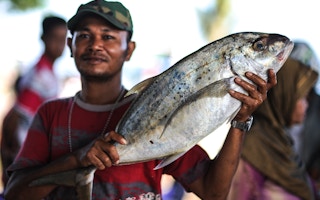Seven years after ratifying the Port State Measures Agreement (PSMA), Indonesia has just four compliant fishing ports. It is facing challenges implementing the agreement at these ports, as well as in raising the number of compliant ports, according to the government.
The PSMA helps countries take measures in their fishing ports to prevent illegal, unreported and unregulated (IUU) catch from entering supply chains. Ports can inspect foreign fishing vessels and deny entry or services to vessels involved in IUU fishing.
So far, 68 countries have ratified the agreement. Indonesia ratfied it in 2016.
There’s no official data from the Indonesian government on economic losses resulting from IUU fishing. However, Rokhmin Dahuri, former marine and fisheries minister and current advisor to the government, told a meeting in September 2020 that he believes it averages one million tonnes per year, or US$3 billion.
The four ports compliant with the PSMA comprise three ocean fishing ports – Nizam Zachman in Jakarta, Bungus in Padang, Bitung in North Sulawesi – as well as Benoa, a regular port in Bali that also services tuna vessels. These were selected by the government because they are accessible to foreign reefer ships, which have a draft exceeding nine metres.
The fisheries ministry has acknowledged operational challenges with implementing the PSMA at these ports.
Tri Aris Wibowo, fisheries port director at the ministry, said a lack of officers working in the ports and inadequate port facilities, such as a lack of deep berths, were key challenges in complying with the PSMA.
Three other ports are under consideration for PSMA implementation: Marunda in Jakarta, Tanjung Perak in Surabaya, and Tanjung Wangi in Banyuwangi. While not considered ocean fishing ports, these can all accommodate foreign vessels with nine-metre drafts.
However, there is a debate about the focus of the PSMA implementation, with some arguing it should target all of the country’s 578 fishing ports. Most of these are in the west of the country and serve far fewer, and smaller, ships than the ocean fishing ports.
Sri Yanti, acting director of marine and fisheries affairs at the national development ministry, said “eastern Indonesia is still limited” in terms of the development of its fishing port infrastructure.
Ports in the west tend to be better equipped with the necessary infrastructure and resources to manage larger foreign vessels and enforce the PSMA.
“We are limited in human resources, facilities, and port conditions are still below requirements. That’s our challenge,” said Sri Yanti.
To implement the PSMA, Indonesia had to ensure it had the right legal and regulatory framework in place, and to develop its institutional capacity to carry out inspections and monitor compliance. Minimum port service standards encompass elements such as speed in document checking and inspection accuracy.
Zulficar Mochtar, CEO of Ocean Solutions Indonesia (OSI), an NGO, noted that Benoa port has been inspecting foreign-flagged ships on issues like crew changes and fuel consumption, which can indicate involvement in unreported fishing.
The overall number of ports ready for PSMA implementation in Indonesia remains small when compared to countries like Thailand, which has at least 23 PSMA-compliant ports.
Mochtar says the PSMA plays a vital role, similar to border control, for foreign vessels, encompassing checks on purpose of visit, documents, travel tracking, and IUU fishing history.
He highlighted the national and global challenge of insufficient data in addressing IUU fishing. Global data sharing on IUU is needed among all ports, he stressed, while advocating for more comprehensive monitoring of the movement of fishing vessels worldwide.
Weak data, Mochtar argued, is undermining the effectiveness of policies and strategies. Data for boats, production, fishers, and productivity are still limited, he said.
“It is easy to monitor, inspect and block through the PSMA mechanism. But, if there is no traffic data and indications from those violators, it will be hard to implement.”
He said that challenges for the PSMA include the sharing of vessel records, which can indicate IUU violations, implementing the protocol and standards of the PSMA, and capacity building. “Without these three, PSMA will not be optimal,” he said.
Moh Abdi Suhufan, the national coordinator of Destructive Fishing Watch (DFW) Indonesia, an NGO focusing on sustainable fisheries issues, underscored the need for integrated monitoring and law enforcement under the PSMA.
In addition to deterring illegal fishing, he stressed the importance of ensuring that crews on ships transiting or landing in the PSMA-compliant ports are not subject to forced labour or human trafficking. Currently, there is a lack of mechanisms and tools to monitor crews in PSMA ports in Indonesia, said Suhufan.
This article was originally published on China Dialogue under a Creative Commons licence.

















